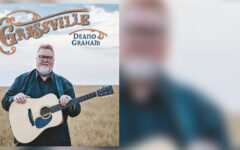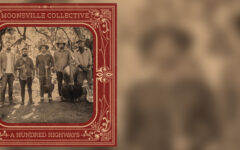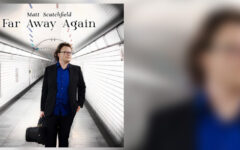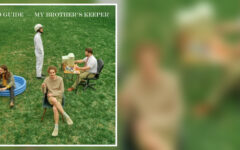
The impact of Tony Trischka on the world of bluegrass banjo is undeniable. With over years in the acoustic music scene, he has released 20 plus albums to date, and that’s not even counting the various number of recordings he has guested on over the years. My first real intro to Tony’s playing was listening to Double Banjo Bluegrass Spectacular on repeat as a 12 year old starting out on banjo. His influence on players such as Béla Fleck, Alison Brown, Noam Pikelny, and many others is obvious, as well as continuing to inspire the next generation of banjo players.
Now 12 years in the making, Shall We Hope is a new 2021 release, which tells tales of love, revenge, and healing. It transports us back to the time of the American Civil War era. Even though this album is shaped from historical fiction, it invites us into the lives of characters from America’s real history as they struggle with the realities of war, death, lost hope, and glimpses of freedom. These emotions and stories are each told by a different character on the 18 track album. From start to finish, we can see the structure and storyline of each character, and how each one searches for the hope of things to come amidst strife.
From start to finish, Shall We Hope is full of vivid songwriting, mighty musicianship, and engaging performances, with a gathering of artists that take on the roles of each character. These featured artists are Michael Daves, Guy Davis, Phoebe Hunt, John Lithgow, Maura O’Connell, and Catherine Russell. Trishka says that the inspiration for this project was partly brought on by a 1938 Gettysburg Reunion video, with a particular scene of opposing soldiers shaking hands across a stone wall 75 years later. This marked a poignant moment, and on a deeper level inspired the next generation to hope.
The album opens with the short prelude Clouds of War, which places us right in the midst of the battlefield, with the sounds of bullets and explosives through the air, all of which were wonderfully designed by Lawson White. If we close our eyes, we can imagine ourselves stepping into a time machine to feel the fear and emotions the soldiers must have experienced. The opening track of music, This Favoured Land,is based on the 1938 reunion gathering at Gettysburg, and speaks of those from either side coming to honor the slain, conveying the emotions and difficult memories from that day on the battlefield in 1863, going on to tell of their fictional characters backstories to set the scene for the rest of the tracks. The recording starts with Tony’s altered tuning banjo, and rolls us seamlessly into Phoebe Hunt’s haunting story telling vocals and fiddle.
Interlude Paddle Wheel brings us round to the scenes and sounds of the steamboats’ whistling and blowing as we make our way to On the Mississippi (Gambler’s Song). The leading light of the New York bluegrass scene, Michael Daves, portrays Cyrus Noble, who tells of his life on the Mississippi with the job of being a riverboat gambler and a Union spy. Trischka’s driving banjo, Alex Hargreaves fiery bluegrass fiddle runs, Dominick Leslie’s tasteful chops, and Daves’ lightening fast guitar licks on this track stand out, and really encapsulate elements of a John Hartford song, while still telling the tale of sudden murder and Cyrus’ own survival after a riverboat accident.
Next we’re carried off to my homeland of Ireland in Carry Me over the Sea. Grammy-nominated Maura O’Connell does a fitting job taking on the role of Cyrus Noble’s wife, Maura Kinnear, an Irish immigrant who worked as a seamstress. This song is filled with the heartache of losing her previous husband in a tragic mining accident. She decides to leave her children, the potato famine, and the hopelessness of it all behind to search for a new life in America. She sets sail on one of the many ships that travelled to the New World. Thankfully Maura made it to America in this story, but many of these ‘coffin ships’ would never make it to their destination. Daves swiftly leads us back into the shoes of Noble, in The General, which recounts elements from the historically known Great Locomotive Chase train robbery in 1862. The beautiful steady fiddling from Brittany Haas, and bowed bass from Skip Ward, starts this track off, imitating the sounds of the train chugging along.
The next 4 tracks – I Know Moon-Rise, Leaving This Lonesome Land, A letter from John Boston to his wife, and Gotta Get Myself Right Back to You – tells the first hand experiences of enslaved Africans during this era. I Know Moon-Rise is adapted from an anonymous spiritual text from the mid-1800s, often associated with African burial rituals, and sung beautifully by jazz and blues vocalist, Catherine Russell. Leaving This Lonesome Land, lends its voice to the story of John Boston the Grave Digger sung by the acclaimed blues musician, teacher, actor and storyteller, Guy Davis. Trishka wrote this song after his visit to the South Asheville Cemetery, where he based his fictional character of John Boston on the cemetery’s actual grave digger, George Avery. A letter from John Boston to his wife (Interlude), and Gotta Get Myself Right Back to You are voiced by Guy Davis in the words of John Boston, which show the sincerity and hope of being reunited with his dear wife after everything is over.
Big Round Top March – Drummer Boys brings us to the sounds of men marching. This introduces a different sound to the album, with a medley of a tune and a song. Trischka borrows elements from well known Civil War songs such as Battle Hymn of the Republic and When Johnny Comes Marching Home on Big Round Top March. He leads the melody on his Bob Flesher 1840s replica Boucher banjo, with Greg Pliska conducting the large brass and woodwind group, until we hear the snare drums of Sean Trischka as they merge into Drummer Boys. This track was wonderfully arranged by acclaimed musician, songwriter, arranger, and record producer Van Dyke Parks, and later with Radio Host Brian O’Donovan giving his voice to portray Colin Noble, the son of Cyrus and Maura. The words and chants of those marching into battle gives us an idea of the emotions and fears that would have been stirring for these young and old men. Maeve Gilchrist joins Brian on harmonies alongside cellist Mike Block.
Christmas Cheer (This Weary Year), is led by Daves on guitar and lead vocals, with Stephanie Coleman and Kristin Andreasson on harmonies, and Haas, Leslie, Trischka and Ward holding down the instrumental lines. A festive feeling allows this one to take us back in time to the holiday season on the battlefield, where every soldier longed for the peace of the season to shower over both sides, and for there to be a cessation of fighting, if only just for that one night. Dearest Friend And Only Lover, is drawn from the historical letters of Mary Epperley, A.A Harrison, and Cusey. In this song we hear the characters of Cyrus Noble and Maura Kinnear exchanging letters of heartfelt love for each other, and the recognition that they do not hold the future, but they hope and pray to be in each other’s arms once more.
Daves conveys the horrific scenes of battle in Clouds Still Drift across the Sky, through the words of Noble as he fights at Gettysburg. The delicate string arrangements and emotion of the performers makes the pain and anguish of this track visceral. Trischka wrote the music for this track as well as the lyrics, with the help of his son Sean. Trischka’s concept of playing his Golden Clipper banjo with no picks really impacts this track, and sets it apart from the other banjo sounds on this album.
The penultimate track on the album is a straight ahead traditional sounding version of the well known (1865) poem by Walt Whitman, O Captain! My Captain. Trischka’s choice for this poem to end the album marks the end of the war, represented in the many who never got to see the end of the stormy and dangerous voyage that they were fighting through. This 18-track album ends with guest John Lithgow’s spoken word on F.D.R At Gettysburg, from an excerpt of President Franklin D. Roosevelt speech at the Eternal Light Peace Memorial at Gettysburg in 1938.
As someone born and raised in Northern Ireland and not having studied much on the Civil War, it has been so enlightening to be faced with these historically accurate and truth-inspired accounts. Trischka has done a wonderful job compiling, writing, fact checking, and playing on all of these tracks. It is inspiring to see this project so full of so many different accounts, and hopefully some of these will resonate with the listeners in different ways.
Superb performances and musicianship are on display from a huge backing of musicians including Brittany Haas, Dominick Leslie, Lawson White, Jared Engel, Alex Hargreaves, Tatiana Hargreaves, Skip Ward, Nate Sabat, and Sean Trischka, to name a few. The playing on every track is so fresh and full of energy, and it is evident that each musician on this project was thrilled to be a part of it. Something that stood out to me when listening to the entirety of the album, was Tony’s choice of banjos used, and how each model, and way that they were played, really helped the stories in the lyrics come to life. If you haven’t got a copy or listened to it yet, sit down with your favorite beverage and enjoy the excellent storytelling and musicianship that this album offers.







